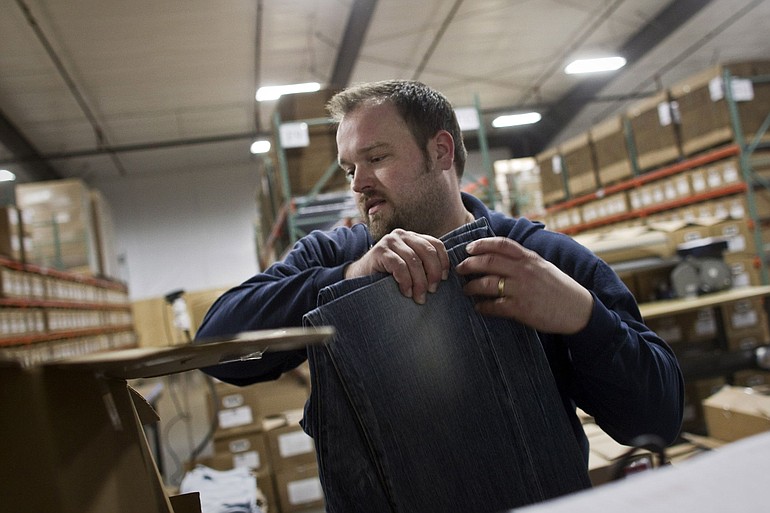Read more about the Sustainable Apparel Coalition
Jeff Shafer’s decision to move his high-end Agave Denim from Southern California to Clark County just under five years ago was all about quality of life, not business strategy.
He and his wife, Lauren, had already moved to Camas to raise their two sons away from California’s crowds and pollution. Before long Shafer wanted to bring the business as well, even though Clark County was far from Agave’s raw materials, production sites, and celebrity customers. He started in Vancouver, moving to Ridgefield in 2009.
Even before the recession’s punch, Shafer wasn’t certain he could pull it off. “In back of my mind I thought if this didn’t work out I could go to work for Nike,” Shafer says.
These days it looks like Shafer’s worries were for naught. He forged ahead with new products during the recession, and it paid off. Agave’s gross sales hit $10.6 million last year, exceeding the pre-recession peak of $10.1 million in 2007. Now Shafer sees further growth opportunities, especially in women’s clothing , which now is just five percent of sales. He hopes to capitalize on rising consumer demand for American-made products.
Wealth of talent tapped
While Shafer, 51, didn’t need Nike as a professional safety net, he’s found that the Portland region offers a wealth of professional talent for his own company because of the presence of Nike and other apparel companies. One exception: Shafer mostly hires models from California, because most of this region’s models are too fit and too slim to fit Agave’s image. “Not curvy enough,” he says.
It’s easy to see how Shafer’s business acumen and his personal enthusiasm for Clark County life make him a poster child among economic development officials seeking to attract new businesses to the county. Agave Denim employs about a dozen people locally, about seven in the warehouse and five in the office. (Lauren Shafer works as a women’s clothing designer). Shafer himself has joined business booster campaigns such as “Land Here, Live Here.”
“This is a fantastic place to operate from,” says Shafer on a recent walk-though of Agave’s warehouse, filled with high-quality jeans and T-shirts that sell for anywhere from $80 to upwards of $250. “There are tons of great people who are talented, family-oriented. It’s adjacent to Portland, which is a big asset.” And, he notes, open fields outside his office window and relaxed country roads to his home on Livingston Mountain north of Camas.
Banking on quality
Agave’s products are sold at specialty clothing shops and through online retailers. About 20 percent of sales are through Nordstrom, Shafer says. The company abandoned its discount outlet sales in Ridgefield, instead selling discounted items through a website and catalog. Shafer says the company will continue to hold warehouse sales twice a year.
No one questions the quality of Agave’s denim. “It just wears beautifully. It doesn’t lose its shape or memory,” said Dawn Stanchfield, owner of the Lily Atelier women’s clothing store in Camas, which has exclusive sales rights for women’s Agave clothing in Clark County. “It’s absolutely one of the best-fitting contemporary lines that fits real bodies.”
Agave uses Supima cotton, a stronger and finer strain that makes up just 3 percent of the world’s cotton production. The cotton for its knit tops comes from a huge farming operation in a dry lake bed at the foot of California’s Mount Whitney. Most of Agave’s denim is made from cotton grown in other parts of the world.
The raw materials make several stops as they are converted to yarn, dyed, and weaved on vintage looms in Japan, Italy, or North Carolina. Final stop is for wet and dry processing facilities near Los Angeles where the clothes are assembled in prepared for market. At the dry production facility, that means making a new pair of jeans look old and worn, Shafer says.
“Every nick, tear, sanding, and grinding is done manually, one at a time,” Shafer says. “No two pairs could be the same.“
Clothing always tells something about a person, and the new-but-old Agave jeans are part of a person’s self-image, Shafer says.
“Everyone cares about their clothes, even if they say they don’t,” he says. “For teens, it’s sometimes to blend in. For people in the arts, it’s a statement. How you feel, and how you feel about yourself, is key.”
In a business environment focused on driving down costs, Shafer makes no apologies about the price tag of his clothing. “When you buy our product, it will last three years and not be replaced after one year,” he says “You can get a high quality product made in U.S., instead of shipping our cash to China and they ship their crap to the U.S. I’m not holding myself up as doing something fantastic, but I don’t feel bad at all about this.”
Hot with celebrities
Shafer has a framed copy of a Rolling Stone magazine cover featuring the rock band Green Day wearing Agave Jeans. Actors Jeremy Renner and Josh Duhamel also made magazine covers in Agave jeans, with those covers posted on Agave’s website. Actor Liam Neeson is a huge fan of Agave, Shaver says, as is Ray Liotta.
Although some companies pay celebrities to wear their products in photo shoots, Agave has resisted such payments. “It doesn’t feel right,” he says. “It’s a totally manufactured process.” Even if his customers are far less battered by economic turmoil than the average American, Shafer faces new challenges in his company’s rarefied market niche.
He’s found that gyrating stock prices immediately affect sales volumes, even if a day’s events on Wall Street hardly puts a dent in a customer’s clothing budget.
“Our customers are same as anyone else emotionally,” Shafer says. “When stocks go down, orders evaporate.” The natural disasters in Japan “put a clamp on business immediately,” he says. He respects their frugality. “My customers got wealthy because they’re smart,” he says.
Costs are rising, he says, for a counter-intuitive reason. In one of the unexpected twists of the highly integrated world market, the rising demand for western clothing among the booming middle class in China and India has driven up the price of regular and Supima cotton. Conventional mills and manufacturers are overloaded with work, driving up costs industry-wide. Supima cotton has tripped in cost in the past several years.
That could add a few dollars to the costs of Agave products, Shafer says, just enough to be irritating. But he has no solution for another of his sales challenges.
“The biggest problem of our product, from a retail point of view, is that consumers can’t wear it out,” he says.




